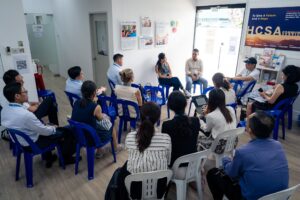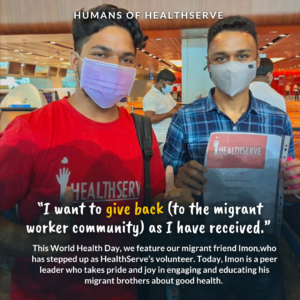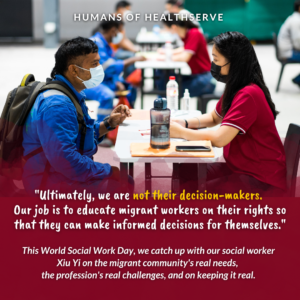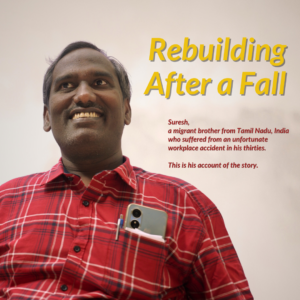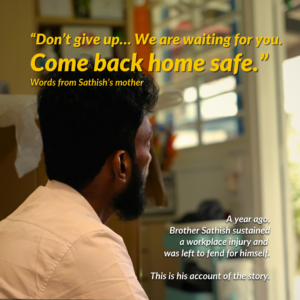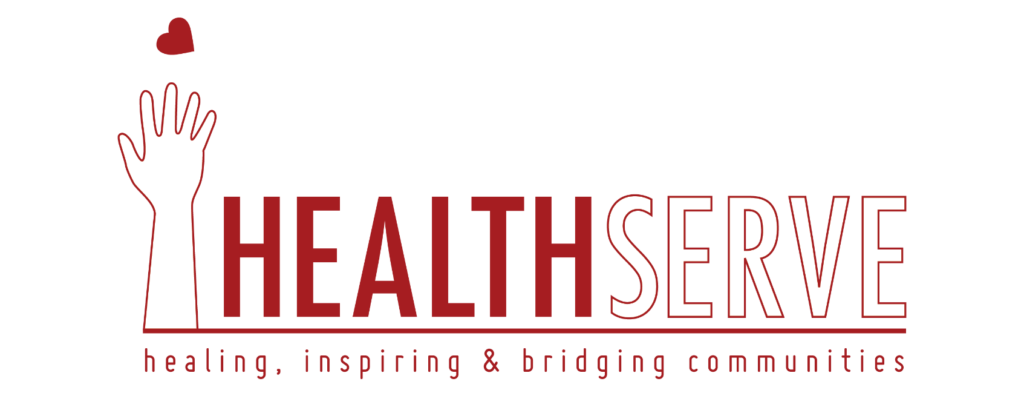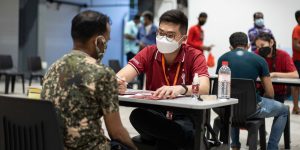In my first meeting with Hasan, we had been speaking for around fifteen minutes when he had to cut his interview short. He had received a phone call, one so important he picked up right after seeing the caller ID.
“I have emergency,” he said. I wondered momentarily if it was about the passport he was awaiting renewal for. It was not. “Sumon at bank, he need help.”
In a lot of ways, this momentary glimpse into their friendship made quite the impression on me. Even to the careless observer, Sumon and Hasan share a bond that is pretty extraordinary.
A few hours later, Hasan returned to the HealthServe drop-in centre at Jalan Besar, this time with a brooding Sumon in tow. I managed to catch Sumon for an interview by himself while Hasan busied himself with helping to translate for another Bangladeshi brother to his caseworker.
“Oh, I’m so sad,” Sumon lamented loudly. He only had six days left in Singapore. To most brothers, this would be a time of uncontrollable excitement. And it was! But for the social butterfly who gets greeted with “Hi, Sumon”s on the street more often than the sun shines in Singapore, this was also going to be a week of sorrowful goodbyes. And one in particular, with his dear friend Hasan.
The flower that blooms in adversity
Sumon met his best friend at a time any rational person would consider their lowest point in life. It was the beginning of 2019. He had just taken a huge loan back home, and had pinned his hopes on being able to not just pay off that loan, but earn some money for his wife and family. This was his second time back, and with the excitement and adventure of working in a new country stripped away, he knew all he had to do was work hard to provide for his family.
Two months in, a heavy metal plank crashing down on him at work, striking his head, neck, and back, suddenly changing the course of all his plans. He fell unconscious, and woke up to unbearable pain he would still remember a year later.
“Very painful, very painful,” he told me with a weak smile. “If I… When I remember that, still, I’m scared.”
As if suffering from a traumatic injury could get any worse, he claimed to have been prescribed only painkillers at the clinic his employer sent him to. He was not sent to a hospital until four days later, where it was discovered that he had suffered a fracture in his spine. When I asked if he had anything to say to the employer, he simply shook his head and said, “I want to say, they follow just rules…. Extra one, we don’t want. Follow the rules, that’s enough. Not only me, every construction worker. It’s a high-risk job.”
He then told me of a friend, a fellow construction worker from Hasan’s company, who sadly passed away.
“You hear? Just two months ago. Very sad.” He took a short pause, keeping to himself before looking to me for the next question. It seemed that even in the face of extreme adversity, Sumon counted his blessings.
One of those blessings came in the form of Hasan, a man who was involved in a worksite vehicle accident just a short 54 days prior to Sumon suffering his injury.
The blessing in disguise
To me, Hasan is quite the larger-than-life character. Apparently he’s never seen wearing the same shirt twice (whereas Sumon is more affectionately known as “the red shirt guy”). A young man who likely overstated his age in order to come here and, after seven long years, is still an eligible bachelor waiting for his parents to find him a wife. He’s incredibly comfortable in front of a camera and microphones don’t intimidate him. He puts on sunglasses whenever he gets a chance to, and he’s quite the guitar player – we think, good enough to be in a boyband!

On the surface, it seems that Hasan is a stylo-milo, can’t-miss-him character. He adores the staff and volunteers like family and greets any foreign faces with a smile.
Dig deeper, and you’ll find a man who cares deeply about his family.
18 days. That’s how long he went without calling his parents after hurting himself in a worksite accident, not wanting to worry them. His right foot was trapped under a thick 2.5 tonne metal slab that had fallen off a truck. The impact was so great that his safety boot cracked open.
“My mother always missing [me], missing [me], then she sick already,” he said. “She asked what happened. I said ‘Nothing, just some accident.’”
Hasan has met calamity and lived to tell the tale, and is a valiant fighter of the depression that once consumed him. And perhaps that’s why he’s the perfect companion to Sumon – just two bodies with the same heart.
Peas in a pod
Hasan returned from his short stint as a translator to the interview room. He took a seat beside Sumon, and the two engaged in a short conversation. And there I was, privy to the inner machinations of a friendship I was made aware about four hours ago.
Two migrant brothers: both injured, both stuck in limbo. Both special pass holders awaiting compensation. Both turned to HealthServe for help when they needed it most, and both gave back in whatever way they could.
Superficially, it seemed the two had nothing in common. Sumon was an aspiring duck farmer, and Hasan, a cow farmer. Sumon had a beautiful wife waiting for him back home; Hasan was still waiting for his parents to select his betrothed. Sumon is never seen without his bag slung across his chest; Hasan never seems to carry anything but his phone.
How did these two become best friends?
My mind conjured the image of Sumon counting the places he’d visited off the top of his head. With a giant smile on his face – Gardens by the Bay, National Gallery, Jewel Airport, the Singapore Zoo (twice!). I asked, and to no one’s surprise, Hasan had been with him on every single one of those outings.
They then mention having gotten much closer when they both received scholarships from HealthServe to attend SDI Academy’s class on Entrepreneurship. Eight weeks of doing homework, attending classes and doing presentations together brought the two friends even closer.

Hasan (in light blue) and Sumon (red) at the zoo. (2019)
Still, true friendship isn’t formed by mere proximity, or circumstance. Making a friend is one thing, but keeping a friend is a whole other ball game. It’s a constant work in progress, a concerted effort on both ends.
So I asked them what they loved about each other. They laughed. It’s not every day a stranger asks you what you like most about your friend.
Still, Sumon answered without a hitch, “Every time I need help, I call him I say, ‘Hasan, I need help.’ He will come.”
Hasan grinned, the memory of him walking out the moment Sumon rang still fresh in both our minds. “I talk to him and I tell him my problems, he make me feel happy. I become less depressed.”

I wouldn’t have known this without asking, but Hasan was nothing short of a light at the end of a tunnel for Sumon. Hasan had visited Sumon in the hospital where he was recuperating, offering him some comfort in a time of distress. Their friendship was a respite from their worries in a time they both described as utterly miserable and depressing. Someone who knew what the other was feeling without prompting or probing; someone who understood, and cared.
Home away from home
Beyond the walls of the room they were being interviewed in, a constant buzz of Hindi music and people talking over one another rang outside – English, Bengali, Tamil, like a cacophony of instruments. The erratic tapping and hitting of the carrom board filled the air like the bass beneath the main melody. The occasional outburst of laughter – the cymbals in the orchestra – filling the inelegant concert hall that was the Jalan Besar drop-in centre, home to most of their memories together.
“I here coming, I think I happy. I go home, feeling boring. I come here, all is happy. I cannot choose one happy moment [at HealthServe], all are happy moments.”
Here, Sumon was happiest. Surrounded by people who spoke his language and people who didn’t but he considered his brothers and sisters anyway. Beyond the occasional pottery lesson or group work session, he spent most of his days just hanging out, chatting, and playing carrom. And more often than not, he had his best buddy by his side.
 Participating in groupwork. (2019)
Participating in groupwork. (2019)
“We talk everything,” Sumon said, glancing at Hasan, “We talk injury, when case finish, when go back home, what the doctor say, when go Geylang, a lot of things, talk everything.”
And when asked what Sumon’s favourite food was, there’s a pause before Hasan whispers something that only Sumon catches. They break out into boisterous laughter. An inside joke that only they understand. “He is naughty boy,” Sumon commented.
Home is where the heart is. And for Sumon, part of his heart never left Bangladesh, but another part of it lives on here, with all the friends and family he made at HealthServe.
Bhai, brother
Six days after my first and last interview with Sumon, we were back at the Jalan Besar drop-in centre. This time, he was on his way home. Not the worksite in Bartley he made do with for the past year, or the HealthServe centres he had come to love, but, home. Back in Kishoreganj, with his wife by his side and his baby daughter in his arms. He was excited to see his baby daughter, his first child, for the first time. Unfortunately he missed her birth as he couldn’t go home until his case was resolved.
“Are you happy?” I asked in greeting.
“So happy, sister.”

Plenty of people came to send Sumon off at the airport. They were staff, volunteers, interns and fellow brothers, all of whom shared a connection with him in one way or another. Those who couldn’t make the trip made sure to have their well-wishes known via video call.
And then it was time to go.
I watched Hasan fuss around with Sumon’s belongings, making sure his luggage was secure, and he had his valuables on him. Sumon made a round of handshakes, thanking us for being there. He embraced his brothers one by one, saving the most precious for last.

Hasan’s eyes well with tears. Sumon gives us all one last wave – pausing with his hand in the air as he examines our faces, in one last curtain call – before walking through the glass doors.
“It’s okay,” Hasan says, “I see him again in Bangladesh.”
Written by: Lavelle Wong (Communications and Engagement Intern, 2020)
